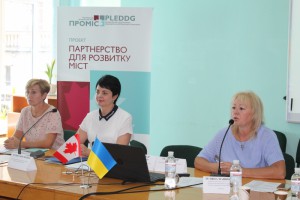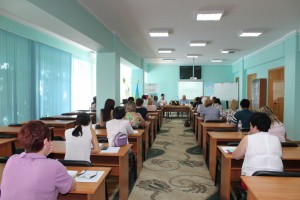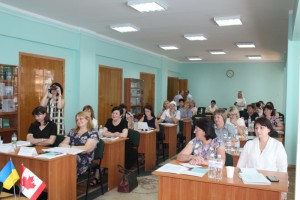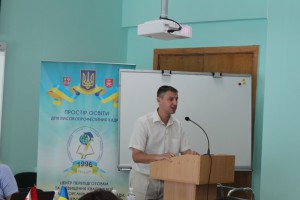Source – Vinnytsia Regional State Administration
Training qualified personnel, which had received further impetus through the de-centralisation reform, was the topic of the round table held at the Centre for Re-training and Advance Training of Public Officials of Vinnytsia region on June 27.
The event focused on information exchange was attended by representatives of local communities together with the expert group of the General Department for Professional Development of Public Employees and Local Government Officials of the NACS, consultants and experts of “Partnership for Local Economic Development and Democratic Governance” (PLEDDG Project), experts of the Council of Europe and professors of the Chair of Regional Management, Local Self-Governance and City Management of the National Academy for Public of Ukraine under the President of Ukraine. The Vinnytsia region was represented by Executive Secretary of the regional council secretariat Tetyana Yaremenko.
After thanking all the PLEDDG Project representatives for the attention to Vinnytsia region, she presented the local governance framework of the region.
“At present the local governance framework of Vinnytsia region includes the regional council, 27 district councils, six councils in cities of regional status, 29 settlement councils and more than 600 village councils”, said executive secretary of the regional council secretariat Tetyana Yaremenko. “Local self-government authorities employ more than five thousand local government officials. Throughout the world local self-governance is considered one of the most democratic forms of local public administration. Local self-government authorities are located in close proximity to the members of territorial communities. Furthermore, this system is devoid of vertical subordination: each authority – from village to regional level – is self-directed and independent in its activities.”
According to Tetyana Yaremenko, the decentralisation reform has raised the bar for the officials employed by local self-government authorities. There are currently 37 united territorial communities and several more are completing the formation process. The draft law on foundations of territorial division of Ukraine is being under discussion.
“The reform also provides for the establishment of executive committees with regional and district councils. This will help build a full-fledged local self-government framework”, said Tetyana Fedorivna.
Tetyana Yaremenko also stressed that these processes call for updating the tasks at hand of the local self-government authorities.
“We have been working on implementing strategic planning of territorial community development, which includes both short-term development programmes and long-term development strategies for a period from three to ten years”, explained the executive secretary of the regional council secretariat. “In my opinion, the implementation of these strategically important programmes would benefit from a more active use of the potential of grant projects by the communities – in particular, including PLEDDG projects. Dear colleagues, I believe that we must redouble the efforts focused on attracting investment into social and economic development of local communities. Local self-government officials must have basic training on grant activities enabling them to search for projects, draft high-quality proposals, and then implement them successfully. The regional council is working on the concept of smart community, which provides for the implementation of a modern management model in territorial communities based on cutting-edge knowledge and state-of-the-art information technology to result in the provision of quality administrative services brought as closely as possible to their recipients, and creation of a comfortable living environment with a modern infrastructure.
Tetyana Yaremenko also stressed the need for following the core principles of legitimacy, egalitarianism, accountability before the community, publicity and transparency in the operations of local self-government authorities.
The program of the “Priority Needs of Local Self-Government Agencies” round table also included a presentation of the state policy for the promotion of activities aimed at providing advanced training to local self-government officials delivered by the chairwoman of expert group Yulia Vernyhor.
“The concept of professional development for local self-government officials and public employees is centred around professional training, advanced training, internship and self-education”, said Yulia Vernyhor.
The attending representatives of local communities of Vinnytsia region were informed about PLEDDG educational projects by PLEDDG Senior Expert in Intergovernmental Cooperation and Economic Development Oleksandr Ignatenko.
Ted Treller, PLEDDG’s Canadian consultant on local economic development, shared the Canadian experience in professional development.
By and large, the round table provided ample opportunity for discussing modern methods and approaches to shaping professional programmes for personnel development.





